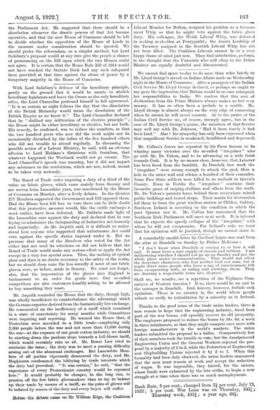Mr. Asquith reminded the House that the duty, though high,
was wholly insufficient to counterbalance the advantage which the German exporter derived from the fantastically low exchange. He commented on the inefficiency of a tariff which remained in a state of uncertainty for many months while Committees were inquiring and reporting. He warned the House that, if Protection were accorded to 'a little trade—employing only 2,500 people before the ,war -and not more than 11,000 during the 'war—at the expense of our great cotton industry, we should he:starting -down-the perilous-slope towards-a full-blown tariff, which would -certainly ruin -us all. Mr. Bonar Law tried to minimise the- issue'; the :duty :was to meet a passing difficulty arising out:of .the:abnormal exchanges. But Lancashire Mem- bers of 'all .parties • vigorously denounced the -duty, :and -Mr. Hopkinson, condemned-the lobbying by trade interests which the dray had provoked. "It was certain," .he said, ";that the experience of every :Protectionist country would be repeated here." It 'would -probably be cheaper, in .the long • run, 'to pension off the few fabric .glovemakers than to ;try to bolster up their trade by 'means of la tariff,.as Ahoprice of gloves.will be inflated by reason of the duty and every buyer will suffer.


































 Previous page
Previous page